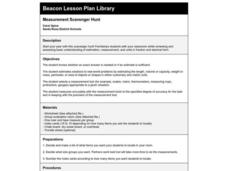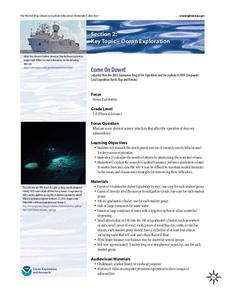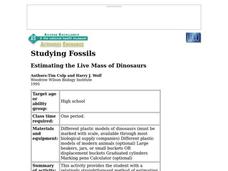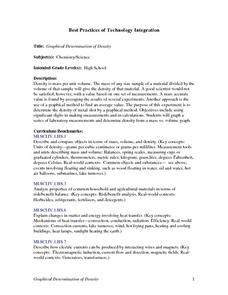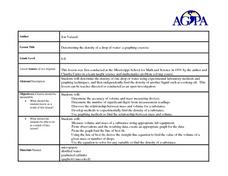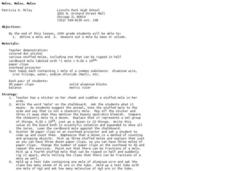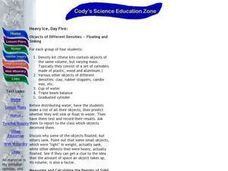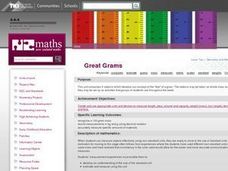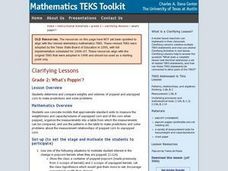Curated OER
Observing and Identifying Matter
In this observing and identifying matter worksheet, middle schoolers use a cookie in a bag and list 10 different descriptions of the cookie. They draw and label their cookie and given the cookie in the bag to their teacher who mixes all...
Curated OER
Density Lab
High schoolers find the density of two substances. In this density lesson plan, students determine the density of water and ethyl alcohol and compare their densities. They enter their data into the computer to produce a class compiled...
Curated OER
The Measurement Man
Students explore the measurements of capacity by constructing a creative project in the shape of a man. The man has body parts that represent different units of measurement and can be used to make conversions. This is highly concrete and...
Curated OER
Measurement Scavenger Hunt
Students review estimation, measurement, fractions, decimals while familiarizing themselves with a new classroom at the beginning of the year.
Curated OER
Measure Twice
Students measure a variety of objects using the appropriate measuring tool. In this measurement lesson, students explain the importance of accuracy and precision in collecting data. They discuss the difference between the two.
NOAA
Come on Down!
What do we do when a dive is too dangerous for humans to accomplish? Send in the robots! Middle school scientists get acquainted with several different models of submersible robots in the second lesson of six from NOAA. Lab groups then...
Curated OER
Egg Measurement
Pupils explore measurement and units. They measure eggs to determine their density, mass and percent composition. An inquiry approach is used for students to ascertain the mass.
Curated OER
Estimating the Live Mass of Dinosaurs
Students calculate the volume of scale model dinosaurs using a water displacement method. They use formulas to calculate the live mass each of the species of dinosaur. Then they complete and discuss a series of questions.
Curated OER
Estimating the Live Mass of Dinosaurs
Learners estimate the live mass of dinosaurs. Using dinosaur and modern animal models, students use simple displacement methods to calculate the volume of the models. They calculate the masses of each model. Learners compare the...
Curated OER
Length and Area
Fourth graders measure one centimeter cubed blocks to determine their size. They measure lines using a worksheet that is not included in the activity. Next, they measure the area of figures on the sheet using the cubes in place of a ruler.
Curated OER
Graphical Determination of Density
Students determine the density of metal shot by a graphical method using significant digits in making measurements and calculations. Students graph a seris of laboratory measurements and determine density from a mass verses volume graph.
Curated OER
Determining the Density of a Drop of Water-A Graphing Exercise
Students determine the density of 1 drop of water. For this determining density lesson plan, students determine the mass and volume of a drop of water in the lab using appropriate lab techniques and calculate the density of a drop of water.
Curated OER
Moles, Moles, Moles
Students investigate moles and measure out a mole by mass and volume. In this mole lesson plan, students observe demonstrations of quantities of substances that measure 1 mole. Students use a solid aluminum block and ruler to measure the...
Curated OER
Heavy Ice: Day Five
Students explore physics by conducting a class experiment. In this density lesson, students examine a list of items and discuss whether they will sink or float and then determine their density. Students examine the objects over five days...
Curated OER
Density of Minerals
Students determine the mass, volume, and density of two different mineral samples. Students show data and calculations as well as answer questions about the mineral identities.
Curated OER
Great Grams
Students measure objects effectively using standard units, They examine how consistency in the units used allows for easier and more accurate communication of mass measures.
Curated OER
Rainbow Jelly
Students work with teaspoons, tablespoons and fractions of a cup to make their own rainbow jelly, converting between units of volume as required. They recognize the need for a standard unit of volume and measure volume using teaspoons...
Curated OER
Measurement Investigations 1
Fifth graders find perimeters, areas, and volumes of everyday objects and state the precision. They work in small groups in order to take measurements, perform calculations, and write a group report about the investigation.
Curated OER
Elementary Exploration: Liquids
Students study the attributes of liquids. In this science exploration activity, students participate in a hands-on activity that requires them to examine the volume and shape of liquid.
Curated OER
Slosh, Dribble, and Plop
Students recognize the need for a standard unit of volume. They estimate and measure to the nearest liter. Also they relate the liter to the familiar everyday containers.
Curated OER
What's Poppin'?
Second graders determine and compare weights and volumes of popped and unpopped corn to make predictions and solve problems. Students combine the data of each group into a graph. They construct questions, statements and story problems...
Curated OER
Seesaws
Students make direct comparisons between objects using balance and spring scales. They also are encouraged to estimate which object is heavier by holding the objects before using the balance scales. Comparing the masses of objects is the...
Curated OER
Supermarket Shopping
Students participate in studying that a kilogram is a standard unit of measurement. They measure practical objects using length, mass, and capacity. They measure a number of supermarket items using units and scales.
Curated OER
Spaced Out
The students are able to use a formula to calculate the volume of cuboids by measuring the length of each of the three dimensions. They also investigate the relationship between milliliters and cubic centimeters.



